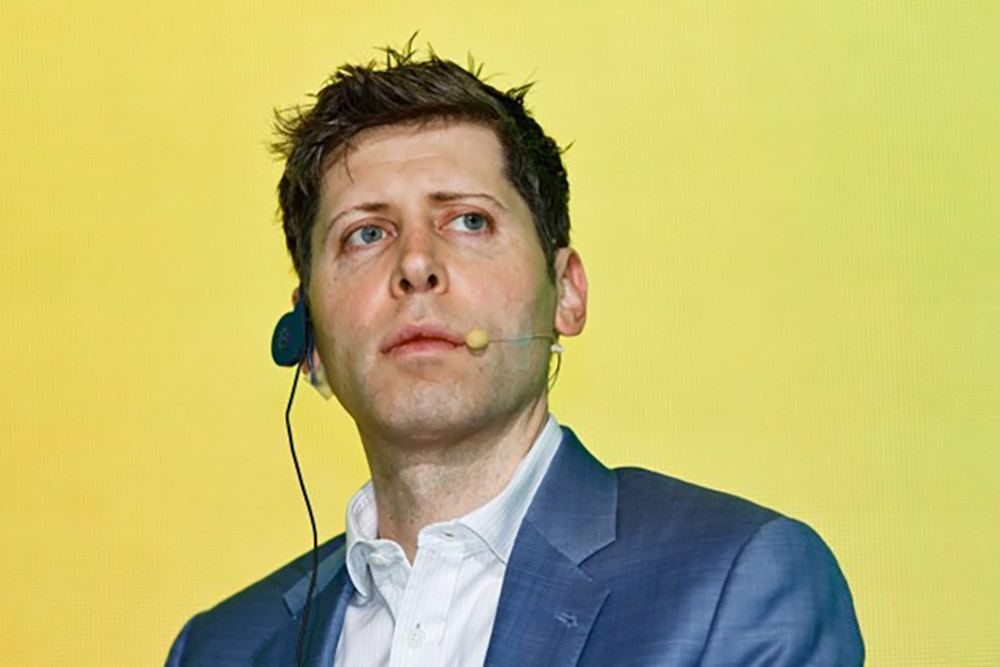
2025年2月,,OpenAI高管曾前往洛杉磯希望與好萊塢各大電影公司達(dá)成合作,,最終空手而歸。據(jù)彭博社(Bloomberg)報(bào)道,,電影公司對(duì)OpenAI處理數(shù)據(jù)的方式存在懷疑,,且2023年好萊塢罷工之后,工會(huì)擔(dān)心工作崗位流失可能引發(fā)抵制,,所以拒絕使用該公司的人工智能視頻生成工具Sora,。
OpenAI與好萊塢合作失敗其實(shí)暴露了更深層次的問題,即該公司似乎不愿證明自己能遵守規(guī)范了娛樂行業(yè)一百多年的合同,、版權(quán)協(xié)議和勞動(dòng)保護(hù)等規(guī)則,。OpenAI不僅疏遠(yuǎn)了價(jià)值超過千億美元的娛樂行業(yè),更是錯(cuò)失向其他行業(yè)展示其有能力建立可靠且長期合作關(guān)系的機(jī)會(huì),。
OpenAI在好萊塢碰壁不僅讓人想起早年間媒體行業(yè)與硅谷的爭端,。2000年代初,Napster似乎有望為用戶提供海量數(shù)字音樂從而顛覆音樂行業(yè),。Napster的服務(wù)一度成為文化現(xiàn)象,,但其運(yùn)營模式建立在分發(fā)未經(jīng)授權(quán)(即盜版)音樂的基礎(chǔ)之上。從長遠(yuǎn)來看,,該公司為無視版權(quán)法付出了沉重代價(jià),。各大唱片公司紛紛提起訴訟,等到Napster想明白談版權(quán)協(xié)議時(shí)為時(shí)已晚,。音樂產(chǎn)業(yè)早已翻篇,,轉(zhuǎn)而和Rhapsody、iTunes以及后來的 Spotify等平臺(tái)達(dá)成可持續(xù)合作協(xié)議,。OpenAI的技術(shù)遠(yuǎn)比Napster強(qiáng)大,,然而結(jié)局可能如出一轍,。
和Napster一樣,OpenAI沒意識(shí)到與現(xiàn)有行業(yè)合作才是實(shí)現(xiàn)長期增長的更好途徑,。OpenAI沒有選擇跟創(chuàng)作者合作,,而是直接抓取新聞文章,未獲得授權(quán)就使用大量書籍資源,,還推出了一款聽起來很像女演員斯嘉麗·約翰遜聲音的語音助手(此前她曾拒絕授權(quán)),。因約翰遜事件受到批評(píng)后,OpenAI聲稱語音來自另一位未具名的女演員,,繼續(xù)我行我素,。這種“先上車再買票”的策略或許曾幫OpenAI在生成式人工智能領(lǐng)域保持領(lǐng)先,但不可持續(xù),。
對(duì)電影公司友好的人工智能
就像當(dāng)年的Napster,,OpenAI正為電影行業(yè)與尊重知識(shí)產(chǎn)權(quán)的人工智能公司合作鋪路。獅門影業(yè)(Lionsgate)就宣布與Runway合作,,打造只用獅門片庫訓(xùn)練的專屬人工智能模型,。該模型透明可控,獅門清楚知道正使用哪些知識(shí)產(chǎn)權(quán),,還能把收益內(nèi)部分配或用于再投資,。詹姆斯·卡梅隆和StabilityAI公司展開合作,將人工智能應(yīng)用在特效制作領(lǐng)域,。資深電影紙片人彼得·切爾寧攜手風(fēng)投基金Andreessen Horowitz,,創(chuàng)立了專注于人工智能的電影公司Promise。
相關(guān)公司與OpenAI不同之處在于,,要么只使用獲得授權(quán)的數(shù)據(jù)訓(xùn)練模型,,要么在藝術(shù)家可控的有限范圍內(nèi)運(yùn)用人工智能,又或是在好萊塢直接參與下成立新電影公司,。然而OpenAI堅(jiān)持掌控一切又不理會(huì)電影人的顧慮,,最終可能會(huì)發(fā)現(xiàn)自己被拒之門外。
OpenAI應(yīng)該學(xué)學(xué)曾經(jīng)將監(jiān)管當(dāng)成障礙,,后來才發(fā)現(xiàn)合作好處多多的技術(shù)公司,,通常都是在和監(jiān)管機(jī)構(gòu)大戰(zhàn)一場之后才會(huì)醒悟。舉例來說,,Uber一直自我標(biāo)榜“顛覆者”,,最終還是與倫敦和華盛頓特區(qū)等城市政府合作,拿下市政合同的同時(shí)也提升了市場信任,。
OpenAI仍有時(shí)間說服傳統(tǒng)行業(yè),,能做到尊重知識(shí)產(chǎn)權(quán)、數(shù)據(jù)隱私和勞動(dòng)規(guī)則,。
第一步,,OpenAI應(yīng)該提升人工智能訓(xùn)練數(shù)據(jù)方面的透明度,,幫助電影公司和工會(huì)了解正在使用哪些受版權(quán)保護(hù)的內(nèi)容。比如建立內(nèi)容溯源系統(tǒng),,追蹤人工智能生成的劇本或表演等內(nèi)容,,并不需要把整個(gè)模型都公開,。OpenAI,、電影公司和創(chuàng)作者可以請第三方審計(jì),證明模型按照約定的數(shù)據(jù)限制和標(biāo)準(zhǔn)開發(fā),。如此既能滿足要求,,又能保護(hù)專有信息。
OpenAI還應(yīng)該同意以某種方式與版權(quán)所有者分享收益,。雖然電影行業(yè)可能無法復(fù)制 Spotify式版稅系統(tǒng),,但設(shè)立創(chuàng)意基金的核心理念依然可行,尤其是在像Runway與獅門影業(yè)之類可控的合作案例,。思路不是按使用次數(shù)付費(fèi),,而是對(duì)預(yù)先獲批的數(shù)據(jù)集進(jìn)行授權(quán)許可,分享因使用相關(guān)內(nèi)容生成視頻帶來的收益,。
OpenAI在好萊塢的機(jī)會(huì)
整合數(shù)據(jù)其實(shí)有很大機(jī)會(huì),。OpenAI可以參考類似模式,與工會(huì)及各電影公司合作開發(fā)已獲得授權(quán)的版權(quán)內(nèi)容套餐,。哪怕只是有限的系統(tǒng),,也能體現(xiàn)出合作的誠意。對(duì)OpenAI來說,,最大的風(fēng)險(xiǎn)不是細(xì)節(jié)處理不當(dāng),,而眼睜睜看著競爭對(duì)手大步向前自己卻無所作為。
順著這一思路,,OpenAI應(yīng)該更廣泛地與好萊塢接觸,,不僅包括電影公司,還有從業(yè)者和創(chuàng)作者,。2023年的罷工事件表明,,工會(huì)能影響公眾輿論和相關(guān)政策走向,長遠(yuǎn)戰(zhàn)略必須加以考慮,。將人工智能帶來的部分收益分配給行業(yè)專業(yè)人士,,就表明OpenAI意在與人類人才攜手合作,而不會(huì)繞過他們,。如此舉措能讓人工智能被看成創(chuàng)意伙伴而不是威脅,,也有助于OpenAI從運(yùn)作不透明的通用模型中脫穎而出。
上個(gè)月,,400多名好萊塢創(chuàng)作者聯(lián)名致信白宮,,主張人工智能公司應(yīng)像其他行業(yè)一樣遵循版權(quán)法,。“削弱或消除幫助美國繁榮的版權(quán)保護(hù)制度完全沒理由,,”信中寫道,。OpenAI拖得越久,越會(huì)給其他公司搶先一步的機(jī)會(huì),。
馬特?斯坦伯格是喬治城大學(xué)技術(shù)與公共政策學(xué)者,。此前他是負(fù)責(zé)電影和電視開發(fā)的高管。(財(cái)富中文網(wǎng))
譯者:梁宇
審校:夏林
2025年2月,,OpenAI高管曾前往洛杉磯希望與好萊塢各大電影公司達(dá)成合作,,最終空手而歸。據(jù)彭博社(Bloomberg)報(bào)道,,電影公司對(duì)OpenAI處理數(shù)據(jù)的方式存在懷疑,,且2023年好萊塢罷工之后,工會(huì)擔(dān)心工作崗位流失可能引發(fā)抵制,,所以拒絕使用該公司的人工智能視頻生成工具Sora,。
OpenAI與好萊塢合作失敗其實(shí)暴露了更深層次的問題,即該公司似乎不愿證明自己能遵守規(guī)范了娛樂行業(yè)一百多年的合同,、版權(quán)協(xié)議和勞動(dòng)保護(hù)等規(guī)則,。OpenAI不僅疏遠(yuǎn)了價(jià)值超過千億美元的娛樂行業(yè),更是錯(cuò)失向其他行業(yè)展示其有能力建立可靠且長期合作關(guān)系的機(jī)會(huì),。
OpenAI在好萊塢碰壁不僅讓人想起早年間媒體行業(yè)與硅谷的爭端,。2000年代初,Napster似乎有望為用戶提供海量數(shù)字音樂從而顛覆音樂行業(yè),。Napster的服務(wù)一度成為文化現(xiàn)象,,但其運(yùn)營模式建立在分發(fā)未經(jīng)授權(quán)(即盜版)音樂的基礎(chǔ)之上。從長遠(yuǎn)來看,,該公司為無視版權(quán)法付出了沉重代價(jià),。各大唱片公司紛紛提起訴訟,等到Napster想明白談版權(quán)協(xié)議時(shí)為時(shí)已晚,。音樂產(chǎn)業(yè)早已翻篇,,轉(zhuǎn)而和Rhapsody、iTunes以及后來的 Spotify等平臺(tái)達(dá)成可持續(xù)合作協(xié)議,。OpenAI的技術(shù)遠(yuǎn)比Napster強(qiáng)大,,然而結(jié)局可能如出一轍。
和Napster一樣,,OpenAI沒意識(shí)到與現(xiàn)有行業(yè)合作才是實(shí)現(xiàn)長期增長的更好途徑,。OpenAI沒有選擇跟創(chuàng)作者合作,而是直接抓取新聞文章,,未獲得授權(quán)就使用大量書籍資源,,還推出了一款聽起來很像女演員斯嘉麗·約翰遜聲音的語音助手(此前她曾拒絕授權(quán)),。因約翰遜事件受到批評(píng)后,OpenAI聲稱語音來自另一位未具名的女演員,,繼續(xù)我行我素,。這種“先上車再買票”的策略或許曾幫OpenAI在生成式人工智能領(lǐng)域保持領(lǐng)先,但不可持續(xù),。
對(duì)電影公司友好的人工智能
就像當(dāng)年的Napster,,OpenAI正為電影行業(yè)與尊重知識(shí)產(chǎn)權(quán)的人工智能公司合作鋪路。獅門影業(yè)(Lionsgate)就宣布與Runway合作,,打造只用獅門片庫訓(xùn)練的專屬人工智能模型,。該模型透明可控,,獅門清楚知道正使用哪些知識(shí)產(chǎn)權(quán),,還能把收益內(nèi)部分配或用于再投資。詹姆斯·卡梅隆和StabilityAI公司展開合作,,將人工智能應(yīng)用在特效制作領(lǐng)域,。資深電影紙片人彼得·切爾寧攜手風(fēng)投基金Andreessen Horowitz,創(chuàng)立了專注于人工智能的電影公司Promise,。
相關(guān)公司與OpenAI不同之處在于,,要么只使用獲得授權(quán)的數(shù)據(jù)訓(xùn)練模型,要么在藝術(shù)家可控的有限范圍內(nèi)運(yùn)用人工智能,,又或是在好萊塢直接參與下成立新電影公司,。然而OpenAI堅(jiān)持掌控一切又不理會(huì)電影人的顧慮,最終可能會(huì)發(fā)現(xiàn)自己被拒之門外,。
OpenAI應(yīng)該學(xué)學(xué)曾經(jīng)將監(jiān)管當(dāng)成障礙,,后來才發(fā)現(xiàn)合作好處多多的技術(shù)公司,通常都是在和監(jiān)管機(jī)構(gòu)大戰(zhàn)一場之后才會(huì)醒悟,。舉例來說,,Uber一直自我標(biāo)榜“顛覆者”,最終還是與倫敦和華盛頓特區(qū)等城市政府合作,,拿下市政合同的同時(shí)也提升了市場信任,。
OpenAI仍有時(shí)間說服傳統(tǒng)行業(yè),能做到尊重知識(shí)產(chǎn)權(quán),、數(shù)據(jù)隱私和勞動(dòng)規(guī)則,。
第一步,OpenAI應(yīng)該提升人工智能訓(xùn)練數(shù)據(jù)方面的透明度,,幫助電影公司和工會(huì)了解正在使用哪些受版權(quán)保護(hù)的內(nèi)容,。比如建立內(nèi)容溯源系統(tǒng),追蹤人工智能生成的劇本或表演等內(nèi)容,,并不需要把整個(gè)模型都公開,。OpenAI,、電影公司和創(chuàng)作者可以請第三方審計(jì),證明模型按照約定的數(shù)據(jù)限制和標(biāo)準(zhǔn)開發(fā),。如此既能滿足要求,,又能保護(hù)專有信息。
OpenAI還應(yīng)該同意以某種方式與版權(quán)所有者分享收益,。雖然電影行業(yè)可能無法復(fù)制 Spotify式版稅系統(tǒng),,但設(shè)立創(chuàng)意基金的核心理念依然可行,尤其是在像Runway與獅門影業(yè)之類可控的合作案例,。思路不是按使用次數(shù)付費(fèi),,而是對(duì)預(yù)先獲批的數(shù)據(jù)集進(jìn)行授權(quán)許可,分享因使用相關(guān)內(nèi)容生成視頻帶來的收益,。
OpenAI在好萊塢的機(jī)會(huì)
整合數(shù)據(jù)其實(shí)有很大機(jī)會(huì),。OpenAI可以參考類似模式,與工會(huì)及各電影公司合作開發(fā)已獲得授權(quán)的版權(quán)內(nèi)容套餐,。哪怕只是有限的系統(tǒng),,也能體現(xiàn)出合作的誠意。對(duì)OpenAI來說,,最大的風(fēng)險(xiǎn)不是細(xì)節(jié)處理不當(dāng),,而眼睜睜看著競爭對(duì)手大步向前自己卻無所作為。
順著這一思路,,OpenAI應(yīng)該更廣泛地與好萊塢接觸,,不僅包括電影公司,還有從業(yè)者和創(chuàng)作者,。2023年的罷工事件表明,,工會(huì)能影響公眾輿論和相關(guān)政策走向,長遠(yuǎn)戰(zhàn)略必須加以考慮,。將人工智能帶來的部分收益分配給行業(yè)專業(yè)人士,,就表明OpenAI意在與人類人才攜手合作,而不會(huì)繞過他們,。如此舉措能讓人工智能被看成創(chuàng)意伙伴而不是威脅,,也有助于OpenAI從運(yùn)作不透明的通用模型中脫穎而出。
上個(gè)月,,400多名好萊塢創(chuàng)作者聯(lián)名致信白宮,,主張人工智能公司應(yīng)像其他行業(yè)一樣遵循版權(quán)法?!跋魅趸蛳龓椭绹睒s的版權(quán)保護(hù)制度完全沒理由,,”信中寫道。OpenAI拖得越久,越會(huì)給其他公司搶先一步的機(jī)會(huì),。
馬特?斯坦伯格是喬治城大學(xué)技術(shù)與公共政策學(xué)者,。此前他是負(fù)責(zé)電影和電視開發(fā)的高管。(財(cái)富中文網(wǎng))
譯者:梁宇
審校:夏林
In February, executives from OpenAI visited Los Angeles, hoping to strike deals with major Hollywood studios. They left empty handed. The studios declined partnerships to use Sora, the company’s AI–powered video generation tool, Bloomberg reported, citing concerns over how OpenAI would use their data and potential backlash from unions worried about job losses following the 2023 Hollywood strikes.
OpenAI’s failure to win over Hollywood exposes a deeper issue for the company: It seems unwilling to prove it can work within the contracts, licensing agreements, and labor protections that have governed the entertainment business for more than a century. OpenAI isn’t just alienating the $100 billion-plus entertainment business—it is missing an opportunity to show other industries that it’s capable of building viable, long-term partnerships.
OpenAI’s Hollywood misadventure is reminiscent of an earlier dispute between the media industry and Silicon Valley. In the early 2000s, Napster seemed poised to upend the music industry by offering users an unprecedented digital catalog of songs. The service became a cultural phenomenon, but it was predicated on distributing unlicensed (stolen) music, and the company’s refusal to engage with copyright law proved costly in the long run. Major labels sued, and by the time Napster realized it was better off negotiating licensing deals, it was too late. The music industry had moved on, opting for sustainable agreements with services such as Rhapsody, iTunes, and eventually Spotify. OpenAI’s technology is far more transformative than Napster’s, but its story could look the same.
Like Napster, OpenAI fails to see that working with established industries is the better path to long-term growth. Instead of engaging with creators, OpenAI has scraped news articles, ingested entire libraries of books without securing rights, and launched a voice assistant that sounded a lot like Scarlett Johansson (who had previously denied permission). Amid criticism around the Johansson case, OpenAI claimed the voice belonged to a different unnamed actress and carried on. That strategy—move fast, ask for permission later—may have worked so far to make OpenAI the dominant player in generative AI, but it’s not sustainable.
Studio-friendly AI
As Napster did, OpenAI is opening the door for the film industry to partner with AI companies that respect its intellectual property. Lionsgate announced a partnership with Runway to build a proprietary AI model trained exclusively on the studio’s catalog. The resulting model will be fully transparent and controlled—Lionsgate knows exactly what IP is being used and can distribute revenue internally or reinvest it. Similarly, James Cameron has teamed with StabilityAI to bring AI to special effects, and veteran film executive Peter Chernin joined with Andreessen Horowitz to launch an AI-native studio, Promise.
These ventures differ from OpenAI in that they are either training models exclusively on licensed data, using AI in narrow, artist-controlled pipelines or building new studios with Hollywood’s direct involvement. By insisting on control and not acknowledging filmmakers’ concerns, OpenAI may eventually find itself on the outside looking in.
OpenAI should learn from other tech companies that once saw regulation as an obstacle but later realized the benefits of cooperation—often after bruising fights with regulators. For example, Uber touted itself as a “disruptor,” yet it eventually worked with city governments including London and Washington, D.C. to secure municipal contracts and bolster market trust.
OpenAI still has time to convince legacy industries that it can respect intellectual property rights, data privacy, and labor rules.
As a first step, OpenAI should offer more transparency around its AI training data, helping studios and unions understand what copyrighted material is being used. A content provenance system that traces AI-generated outputs like scripts or performances would not require the model to be fully disclosed. OpenAI, studios, and creators could rely on third-party audits to certify that the models were developed with agreed-upon data restrictions and standards. This can be done while still protecting proprietary information.
OpenAI should also agree to share revenue with rights holders in some way. A Spotify-style royalty system may not be replicable for film, but the core idea of a creative fund is still viable—especially in controlled cases like Runway’s deal with Lionsgate. The idea isn’t to pay per use, but to license pre-approved datasets and share revenue tied to the videos derived from that content.
OpenAI in Hollywood
There’s a real opportunity in bundling data: OpenAI could adopt a similar model using licensed bundles of copyrighted content, developed in partnership with unions and individual studios. Even a limited system would demonstrate a willingness to collaborate. The greatest risk for OpenAI isn’t in getting the details wrong—it’s in doing nothing while competitors move ahead.
In this vein, it’s in OpenAI’s best interest to engage more broadly with Hollywood—not just studios, but labor and creators. The 2023 strikes showed that unions shape public narratives and policy, and any long-term strategy must reflect that. Funneling a portion of AI-driven revenue to industry professionals would signal an intent to work with, not around, human talent. This kind of initiative could reframe AI as a creative partner, not a threat, and help OpenAI stand apart from opaque general-purpose models.
Last month, more than 400 Hollywood creatives sent a letter to the White House, arguing that AI companies should follow copyright law like any other industry: “There is no reason to weaken or eliminate the copyright protections that have helped America flourish,” the letter said. The longer OpenAI waits to act, the more it opens the door for others to do so first.
Matt Steinberg is a Tech and Public Policy Scholar at Georgetown University. He was previously a film and television development executive.






